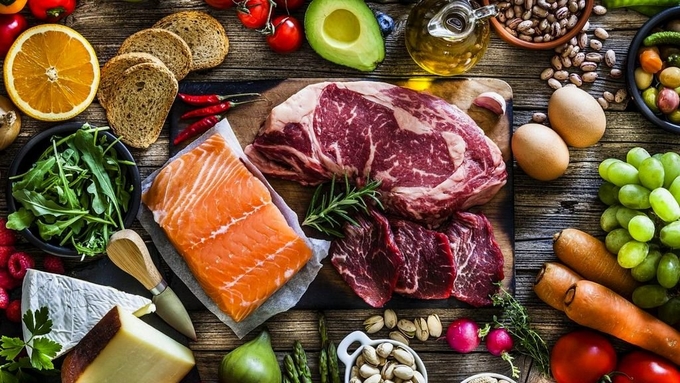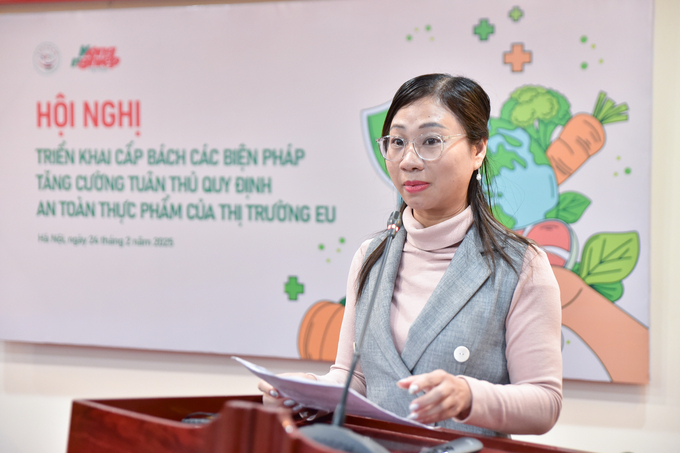November 19, 2025 | 02:23 GMT +7
November 19, 2025 | 02:23 GMT +7
Hotline: 0913.378.918
November 19, 2025 | 02:23 GMT +7
Hotline: 0913.378.918

EU has many regulations and continues to update and supplement them in order to manage the risks to the health of the community and to implement the opinions of the EU's food safety agencies.
In general, the EU mandates that products imported into the country adhere to five regulations. The EU General Food Law is the name of the regulation (EU) 178/2002. Its objective is to establish a foundation for the rigorous preservation of human health and the interests of consumers in the context of food and feed.
Next, the EU Regulation 1005/2008, which aimed to prevent, deter, and eliminate illegal, unreported, and unregulated (IUU) fishing, became effective on January 1, 2010.
Third, Commission Implementing Regulation (EU) 2019/1793 of 22 October 2019 on the temporary increase of official controls and emergency measures.
Fourthly, Commission Delegated Regulation (EU) 2022/2292 of September 6, 2022, which supplements Regulation (EU) 2017/625 of the European Parliament and of the Council with respect to the requirements for the entry into the Union of consignments of food-producing animals and certain goods intended for human consumption.
Fifth, the European Union Deforestation Regulation, which was originally scheduled to be implemented in January 2025 but has not yet been entirely enacted due to recent 12-month delay. Seven categories within the EU are of concern: coffee, palm oil, wood, rubber, beef, cocoa and soybeans.
Nguyen Thu Huyen, a specialist at the Vietnam SPS Office, stated that the EU has many regulations and continues to update and supplement them in order to manage the risks to the health of the community and to implement the opinions of the EU's food safety agencies.
Currently, Ms. Huyen asserts that all processed animal-origin products found in composite products must be sourced from facilities that have been certified by the EU and are situated in countries that are authorized to export such processed animal-origin products to the EU. In particular, the European Parliament and the Council's Regulation (EC) No. 852/2024 and Regulation (EC) No. 853/2004, dated April 29, 2004, establish specific sanitary regulations for foods that contain products of animal origin.
These two regulations establish extremely precise standards for food, encompassing the control processes, registration protocols, transportation requirements, and facility guidelines that enterprises must comply with, from production to the final product. Specifically, facilities that manufacture composite food products are required to either register or obtain sanction from European authorities, contingent upon the product's characteristics.

Nguyen Thu Huyen, a specialist at the Vietnam SPS Office. Photo: Tung Dinh.
Additionally, Europe intends to oversee the residue levels of composite foods imported from abroad. Consequently, the country of origin of any composite product must be specified in "Annex I of Commission Regulation (EU) 2017/625" and further elaborated upon in the "Annexes of Regulation 2021/405" (specifically for commodities in which processed products of animal origin are components of the composite product).
According to a veterinary quarantine expert from the Vietnam SPS Office, it is essential to adhere to the general provisions of "EU Regulation No. 2021/404." This regulation encompasses a comprehensive list of countries that are authorized to export animals and animal products, a detailed description of the regions within those countries or territories that are authorized for export, specific conditions for each product in each country, and the necessity of veterinary quarantine certification for products from each respective nation.
In terms of the certification system, composite products that do not necessitate controlled storage, as well as those that do but contain products derived from colostrum or processed meat that is not gelatin or collagen, are required to obtain a "Official Certificate" (Chapter 50 of Annex III of Commission Implementing Regulation (EU) No. 2020/2235).
In contrast, composite products that necessitate controlled storage and contain products of animal origin (as per Regulation (EC) 853/2004) but do not include products made from colostrum or processed meat that is not gelatin or collagen will necessitate a "Separate Certification" (Annex V of Commission Implementing Regulation (EU) No. 2020/2235).
Lastly, Regulation (EU) 2021/632 explicitly specifies that all composite products are subject to border control inspection.
Ms. Nguyen Thi Huyen issued a warning to businesses in light of the numerous regulations that Europe will continue to update and supplement its regulatory framework. For instance, the certificate template in Commission Regulation (EU) 2020/2235 has been amended 15 times, EU Regulation 2017/625 was replaced by Regulation 2022/2292 (dated 6 September 2022), which has been amended twice, and EU Regulation 2021/404 on veterinary quarantine has been amended 112 times.
Therefore, it is recommended that businesses maintain a consistent level of awareness regarding revisions to European regulations. Huyen also recommended that they seek detailed guidance from the Vietnam SPS Office regarding these revisions.
According to Phan Van Tan, the Deputy Director of the Department of Agriculture and Rural Development in Binh Thuan province, the EU has recently implemented more stringent and rigorous regulations regarding the administration of product inputs. Then, he advised that the Vietnam SPS Office and the Vietnam TBT Office provide additional detailed and timely guidance and support to guarantee that the province's two flagship products—dragon fruit and seafood—continue to trade efficiently when exported to the EU.
The storage of agricultural products, including fruits, is a challenging task, necessitating rapid adaptation to guarantee quality production, according to Nguyen Quoc Tri, Chairman of the Long An Dragon Fruit Association. Nonetheless, the quality of pre-processing is incomplete. Tri recommended that regulatory agencies, enterprises, and producers collaborate to address these deficiencies.

(VAN) Fishermen and authorities in Khanh Hoa province are demonstrating strong resolve in the fight against IUU fishing, aiming to develop a sustainable fisheries sector and remove the European Commission's (EC) ‘yellow card.’

(VAN) Viet Nam has declared that it will develop and implement strong greenhouse gas reduction measures to achieve Net Zero emissions by 2050 and it is following through on that commitment.

(VAN) A comprehensive legal framework, tailored to domestic conditions, serves as the foundation guiding economic sectors toward low-emission development.

(VAN) Mastering technical skills and leveraging the advantages of Dau Tieng Lake, residents of Loc Ninh have created a sustainable pathway out of poverty.

(VAN) The entire political system of Dak Lak is taking strong and synchronized action against IUU fishing. The province has achieved a 100% rate of installing VMS on vessels over 15 meters in length.

(VAN) Geology and minerals play a foundational role, providing 'green and high-tech materials' for sustainable economic development.

(VAN) After 80 years, Lang Son’s agriculture and environment sector has affirmed its position through innovative thinking, modernized management toward a green, smart, and sustainable development.